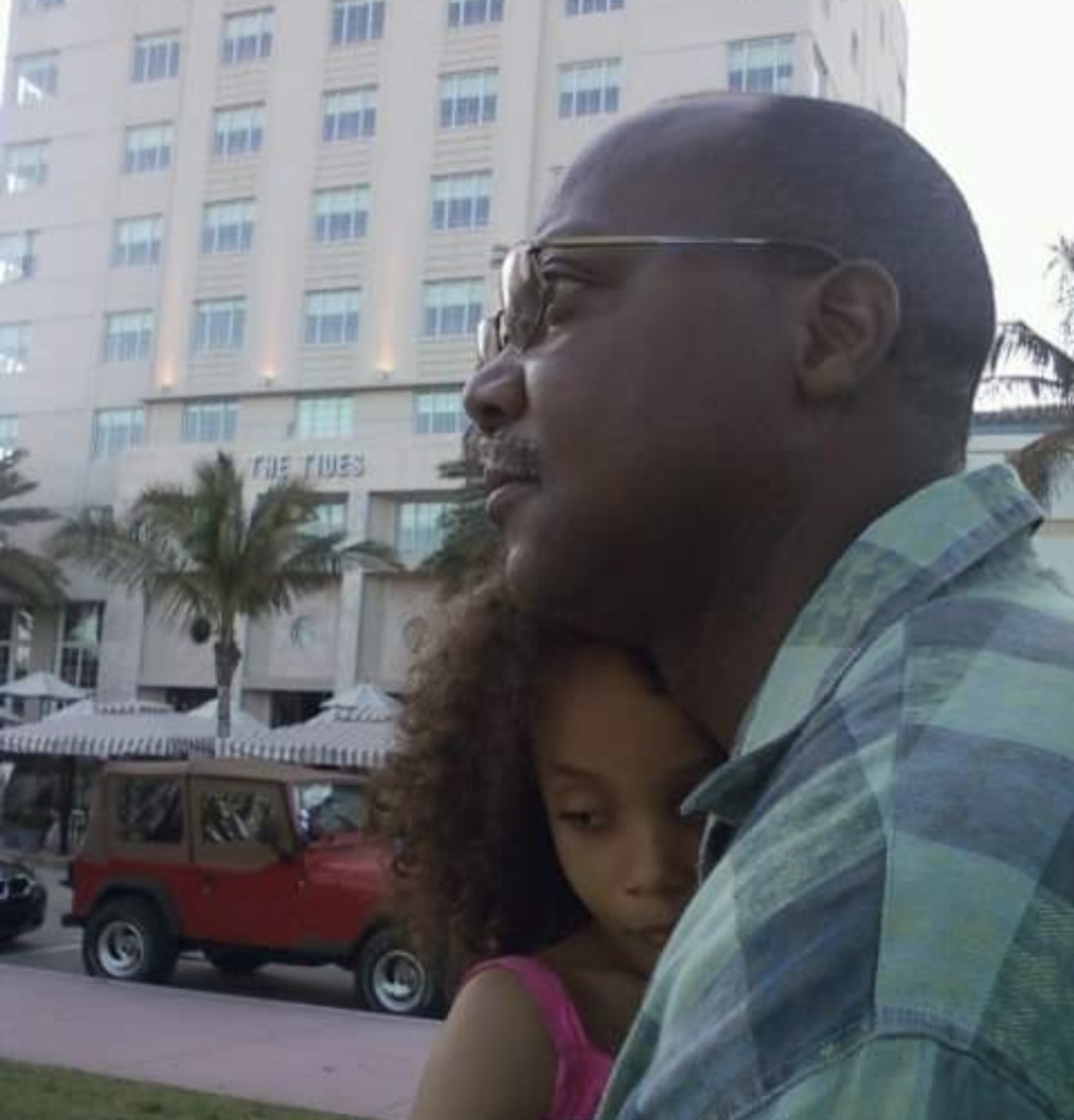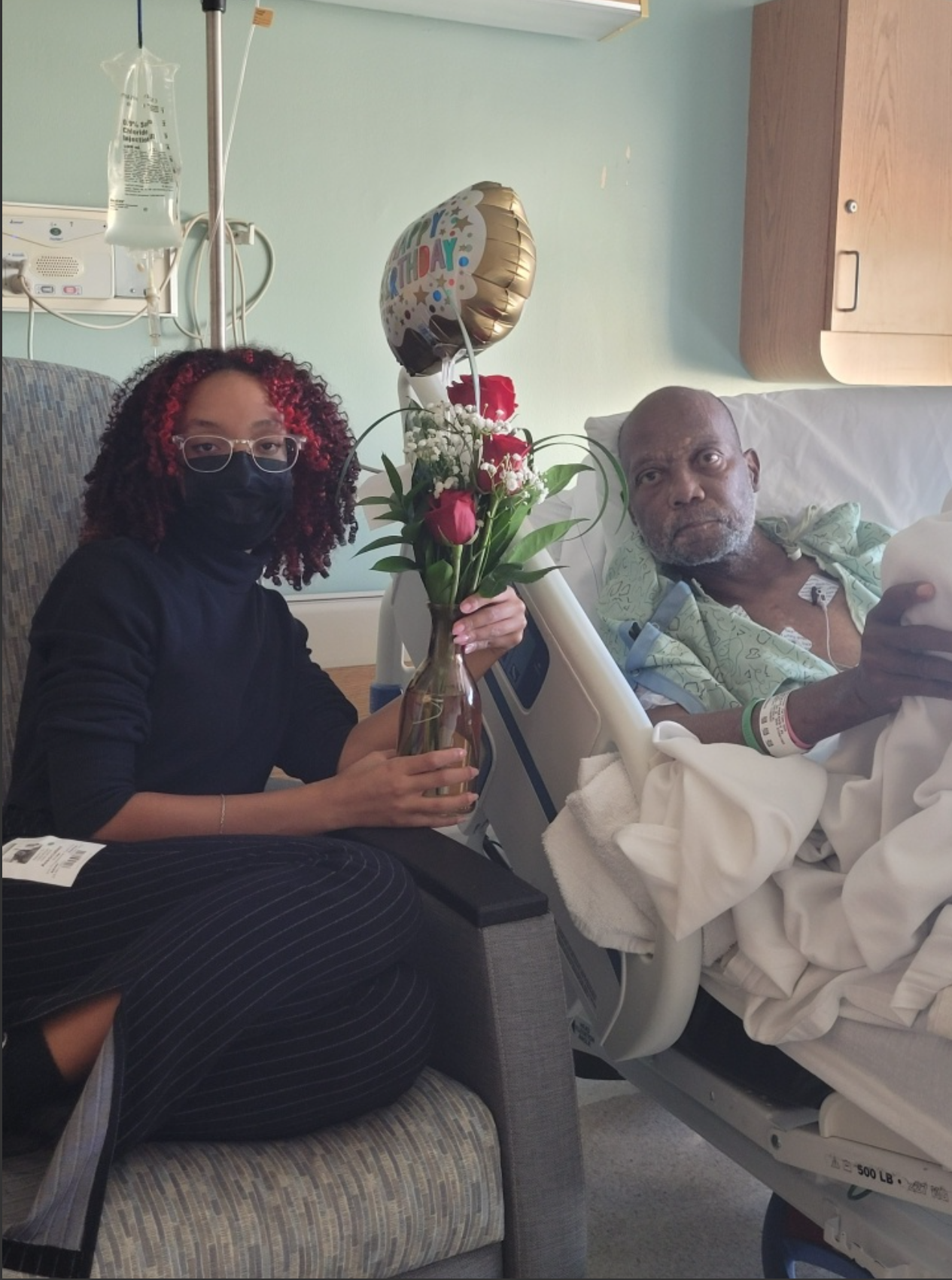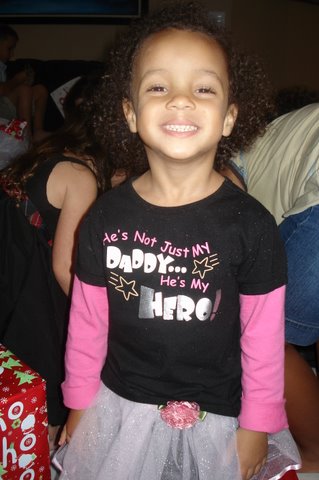A recount of a life spent in hospitals and foreign feelings of grief

Walker, 6, and her father years after her father’s second heart transplant.
January 17, 2024 | Story and photos provided by Lindee Walker
This article is part of Atrium’s Winter 2023 issue. To view the print edition online, visit our Issuu here
It was a sunny February day when my family began to open Christmas presents.
The Christmas tree became a plain tree, then became a Valentine’s Day tree. My mom couldn’t stand to take it down before my dad got to see it, so she redecorated as the weeks passed to have something to do with her stricken hands as the months trudged on.
There were flecks of blue and gold tinsel married to our carpet at random intervals and pink, glittery hearts scattered around where the tree stood, a little crooked and strange. She had anxiously shifted the furniture over an inch every day leading up to my dad’s return home.
He would be the only one to notice. When he precariously nudged his wheelchair back into our living room for the first time, he said, “Well, look at all this space!”
He noticed the small details. In all my 18 years, I had never seen him be anything but attentive. When my boots grew dull, he swooped in at night with a rag and shoe polish. When my sister ran out of almond milk, he replaced it before she could even notice herself. When he noticed my mom’s anxious hovering, he complimented the arrangement of the furniture.
When he crept up to the couch in the unfamiliar wheelchair and hoisted himself up and over the lowered armrests, I understood how parents felt seeing their child take their first steps. It reminded me of the story my dad told about me for many Thanksgivings.
“When I first took her training wheels off, I looked away for four seconds before she was speeding away from me all by herself!” he would brag.
Back in the present, I pulled the breaks on his wheelchair before it could skew itself away.
He sunk down onto our corduroy couch. I had never realized how plump and deep the brown cushions were, until I watched him sink deeply into them, inch by inch by inch, until he settled.
When his visit home was over, the sky was a wan shade of bruised blue, and the sun began to look like a stranger in the sky. I began to truly hate hospitals then.
A few days later, my mother finally took down the Christmas tree. It was the last time my dad went home.

I used to collect electrocardiogram stickers. I collected a lot of things, because when you stay in a hospital for months at a time, there is not much else to do but become a collector of things.
A withered and stained shoebox of pinecones, acorns, Disney princess stickers and numerous stuffed animals from hospital staff kept me busy while I sat in one of the large chairs next to my father’s bed.
I stuck the EKG stickers to my hands so my dad and I would match. Often, when my mother peeled them off as I slept, curled in a cheap gray-green chair with more lumps than I could count at 4 years old, I would spirit another one away from somewhere and watch them peel away from my skin for hours.

When he came home for the first time since becoming sick, it had been seven months. He had always been “sick,” but he never seemed to let himself be reduced to that.
By 2021, the University of Florida Shands Transplant Center in Gainesville performed over 8,000 transplant surgeries. Somewhere in that count is my dad, who received his second heart transplant there when I was 3 years old, but this fact was always made distant by the former track runner, SWAT team member and private investigator I told all my friends about.
Whenever I went to visit my dad in the hospital my senior year, I remember my hate for many things in hospitals. The way the ID sticker printer squealed and sputtered at the front desk grated against my ears. The aching rub of wheels on tile, attached to a bed frame, attached to a bed, attached to a person whose eyes I avoided like their illness could sear me where I stood, hunched on the elevator wall.
I slept in one of the beds once, nestled against my dad, when I was too small to do much damage to the yards of tubing and wires connected to his arms and strapped to his chest. I felt like the young woman from “Princess and the Pea,” settled on top of a tall bed and unable to truly rest.
Some of my earliest memories are of men and women in pale blue masks and dark blue gloves, of tangling my thin wrists up in wires and tubes when my mother looked away, of scratchy beige blankets with no patterns and no scent. Though I couldn’t find comfort in any of the sterile corners here, the familiarity of it was something that somehow became a part of me.

Walker sits with her feet up and her shoes off in a hospital chair next to her father. It is November 24, 2022, her birthday.

My dad never complained about his first transplant, or his second, or the diabetes he developed somewhere along the way, or the kidney transplant he was told he needed but probably would not get because he was “too sick.” He didn’t talk much about the medications he took to keep his heart working and his blood from clotting, and he didn’t even talk much about his back and forth to our local hospital every so often.
By the time I was 18, I had visited some hospital room or another more times than I could count, but I couldn’t bring myself to not be a little bitter.
There was something special in the fact that I had watched my dad overcome each trip, yet the bitterness remained.
There was nothing special about the fact that I spent my senior year of high school with half my heart in either a hospital room or a rehabilitation center where my dad was supposed to learn how to walk again.
We ended up back at Shands overnight one day in late March, just a month after my dad had taken his first and last day trip home in “good health.” Diseases work in mysterious ways sometimes. Hope became a deceptor. When my mom mentioned the hospital by name, I knew my dad was dying.
I hadn’t been to this wing I was 3 years old. I was much bigger this time, and still the automatic doors and check in desks towered over me.
Grief was a strange creature to me. It writhed under my skin and became something terrible in that hospital lobby. My bitterness was really grief this whole time, and it turned into frustration and anger and transformed into many things before it finally settled into something superiorly messy.
People with kidney failure usually become dialysis patients. For four hours, three times a week, their blood gets filtered out of their bodies by a machine. I could never really understand the trouble of this physically, but these feelings became something my body could not process and could not expel. It was something vile in my blood, and it festered inside me. It felt as if something foreign was taking up my body, slowly replacing each of my organs.

I figure I could reflect on my years spent in dingy hospital chairs and cafeterias and make something profound out of what I learned from my dad’s bedside. I could talk about how I felt a connection to the hospital my dad died in, the one I was partially raised in, and how it drew me to go to college in the same city.
But I didn’t gain anything from hospitals but a truly unfortunate case of mysophobia and a hatred for the rigid sound machinery makes when it beeps. I went to college in Gainesville because I knew my dad would be proud of me no matter what. In the wake of my grief, there were no fond feelings to be had — though I appreciated the kind doctors and nurses who took care of my dad and alway brought us warm blankets.
Grief has a way of making you feel like you’ve been transplanted. It turns you inside out and upside down. It takes a lot of fortitude to learn to let it live inside you and to learn how to scrub it from your skin when it clings.
I learned nothing about strength or fortitude from my relationship with hospitals, but I learned everything about those two things from my dad.

Lindee Walker, recently 4 years old, a few months after the hospitalization of her father in 2007.

Lindee Walker
Lindee Walker is a writer and graphic designer. She finds joy in the rain, in people, and in books.